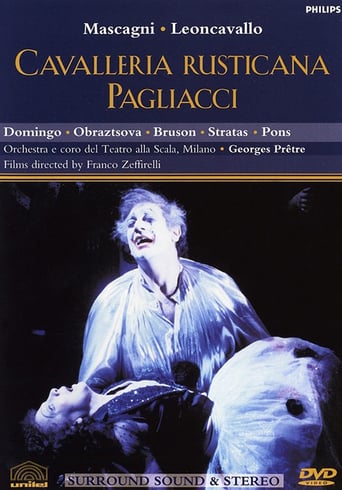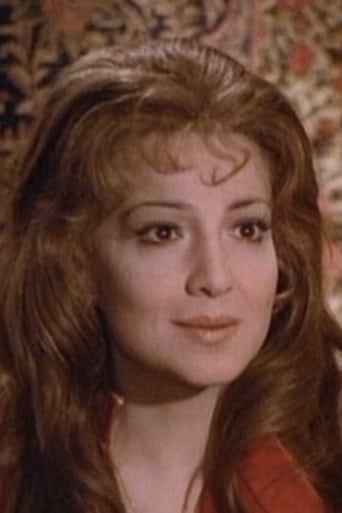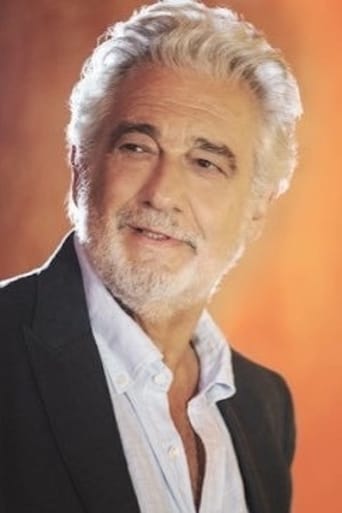

Pagliacci (1987)
The story is set in southern Italy and recounts the tragedy of Canio, the lead clown (or pagliaccio in Italian) in a commedia dell'arte troupe, his wife Nedda, and her lover, Silvio. When Nedda spurns the advances of Tonio, another player in the troupe, he tells Canio about Nedda's betrayal. In a jealous rage Canio murders both Nedda and Silvio. Although Leoncavallo's opera was originally set in the late 1860's, Zeffirelli's production is updated to the period between World War I and World War II.
Watch Trailer
Cast


Reviews
Pagliacci (1982) (TV) was directed by the great Franco Zeffirelli. It's not a filmed stage performance. It's a movie based on the verismo opera composed and written by Ruggero Leoncavallo in 1892.For those of you who don't know the plot, I'll summarize it. (If you know the opera, just skip this paragraph.) Canio (Plácido Domingo) is the leader of a group of traveling players. He plays the clown, Pagliacco. His much younger wife, Nedda (Teresa Stratas) is in love with Silvio (Alberto Rinaldi). Tonio (Juan Pons) is a coarse and misshapen member of the company. He lusts after Nedda, but she laughs and humiliates him. The tragic plot unfolds based on these basic elements.Although Leoncavallo set the story in 1865 - 1870, Zeffirelli has moved the period to what appears to be the 1920's or early 1930's. Unlike Cavalleria Rusticana, which was filmed in a Sicilian village, this movie was clearly filmed on a movie set. There's no real attempt at scenic realism. (However, in fairness, this opera has a closed, very intimate feel. "Opening it up" would probably be a mistake.)Teresa Stratas was one of the finest lyric sopranos of the 20th Century, and Nedda was one of her greatest roles. In 1982, Stratas was 44, which is much older than the role written for Nedda. However, Stratas was very beautiful and youthful in a slender, ethereal way, and she looks right for the part. Musically, she is perfection.Domingo was surely one of the greatest tenors in opera history. At 41, he was younger than Canio is supposed to be, but with makeup he fit the role. And, of course, his vocal abilities defy description.Although the opera has many fine arias and duets, when you think of Pagliacci, you think of the great tenor aria "Vesti la giubba" ("Put on the costume"). This is the classic story of a clown with a painted smile, whose heart is breaking. Even if you think you don't enjoy operatic music, you will still be moved by this aria.The movie works well on a small screen. We saw it on DVD, and it was wonderful. It's packaged with another one-act opera—Cavalleria rusticana. These two operas are typically shown together in opera houses as well. Opera lovers call them "Cav and Pag." Usually they are shown with Cavalleria first, followed by Pagliacci. That's the order I would suggest if you watch them on DVD.
I think Franco Zeffirelli is a very talented director. Of all his opera films, I love every single one. All of them, especially La Traviata, are visually beautiful, with wonderful music and superb acting and singing. Pagliacci is no exception. I love two film versions of this great opera to death, this and the 1968 TV version with Jon Vickers as Canio and Herbert Von Karajan, the latter I am more familiar with but there is so much to love about Zeffirelli's film.About Pagliacci itself, it has a quite simple(in its structure) story but its events are very dramatic, especially in Act 2 when Canio comes on stage in his Pagliaccio guise and tells Nedda to reveal her lover and she tries to make it part of the show. It is a great story essentially with themes of love, betrayal and jealousy, with characters that you do care for regardless of their actions. Leoncavallo's music is superb, not just Vesti La Guibba which is heart-rending, but also the amazing Si Puo prologue, the Bell chorus, Non Pagliaccio non son(a real tour-de-force if done right) and Nedda's aria detailing how unhappy she is with Canio, and of her lover.Zeffirelli's direction is immaculate once again, while the film looks exquisite. Maybe not as breathtaking as Cavalleria Rusticana or La Traviata, both of which are textbook examples of how to film an opera, but the photography is wonderfully fluid and the scenery, sets and costumes are lavish. The conducting is musical and enthusiastic, while the orchestra play with a truly great sound that alone makes some parts of the score more emotional at the core than they already are. Excellent singing from the chorus too, and they react very well in the play scene, not only to Canio but also to Tonio and Nedda as well.The singing and acting are superb. Placido Domingo is magnificent as Canio, he is in terrific voice and his presence is as charismatic as ever. His performance of Vesti La Guibba is poignant to the point it is heart-wrenching, while his Non Pagliaccio non son is a brutish and terrifying tour-de-force. Teresa Stratas is an equally wonderful Nedda, she too sounds great and while she shows real delicacy with Silvio her increasing panic in Act 2 is equally impressive. I was also very impressed with Juan Pons, the prologue is sung beautifully. Also while we do feel some sympathy for him like when he is mocked, there are other times, sometimes even in the same scene, when we are repulsed by Tonio and his lust is very mean-spirited here. In contrast to the brutish Canio is a delicate and gentle Silvio, and he is performed with real sensitivity making his and Nedda's scenes one of the most beautiful and most tender scenes of the film, while in contrast the La Commedia E Finita line is very chilling.So all in all, brilliant and another Zeffirelli masterpiece. 10/10 Bethany Cox
In the early 80's, Italian film director Zefferelli (Romeo And Juliet, Taming Of The Shrew, Hamlet) decided he'd transform opera into film, hoping to garner as much success as he had acquired adapting Shakespeare into film. His first project was Leoncavllo's Pagliacci, a turn of the century opera which dealt (at the time) with "realistic subject matter" in a genre of the arts known as verisimo. The dark tale concerns a group of traveling bohemian entertainers. Canio, the principal clown, is blissfully unaware that his girlfriend and fellow performer Nedda has betrayed him with another man. The result: he is crazed with anger and jealousy and kills Nedda during a live performance. The Prologue is well-sung by a bass who connects with the audience in a direct way and who recounts the tragic tale of Canio. Placido Domingo's Canio is by far the most realistic interpretation. Zefferelli championed Domingo as he was a fan of his art and he contracted him and soprano Teresa Stratas to sing La Traviata the following year. Domingo would also appear in Zefferelli's Cavalleria Rusticana and Otello. The unfaithful Nedda is sung by the brilliant Canadian soprano Teresa Stratas. Stratas' Nedda is exquisitely sung, without any melodramatic mannerisms. She plays the role as realistically as possible. It is she who cheats in this opera, but we seem to understand why she would do such a thing. Silvio, her lover, is another moving performance. The Tonio of Juan Pons is appropriately lusty and nasty. The excessive make-up everyone has, the carnival atmosphere of the traveling circus is dizzying, encompassing the theme of madness and killer passions. During the final moments, when Canio kills Nedda on stage, we are indeed shocked to find out it was not staged but real! It is however, Domingo and Stratas' performances that move us. Cinematically, this Pagliacci is a lesser light than Cavalleria, but it's still breathtaking. I enjoyed such moments as when Nedda is singing to the group of children. This is also a very short film and is a perfect "fist" opera experience for anyone who is taking an interest in Italian opera.
The king of opera staging, Franco Zeffirelli, never disappoints. Not when it comes to bringing opera to the screen, in any case. Here, as in LA TRAVIATA, the fantastic pairing of Placido Domingo and the sublime Teresa Stratas is once again triumphant. I PAGLIACCI is a short, one act opera, usually paired with CAVALLERIA RUSTICANA. If viewing I PAGLIACCI alone leaves you hungry for more. Ms. Stratas is perhaps as gifted an actress as she is as a soprano. This is one of the few opportunities to see and hear this now retired soprano, one of the greatest of our time.




